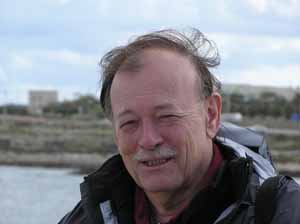
Where is Ron?
Ethiopia, January-March 2006
Ron, windblown in Malta, February 2005
Reports from Debre Birhan, Ethiopia
6-8 February 2006
11 February 2006
Afton VA USADear family and friends,
Here in Virginia it is snowing. We had a much warmer than average January, but in February it has turned back to winter and we are supposed to get 10-12 inches (25-30 cms) of snow this afternoon and evening. I've parked a car at the road end of our long driveway and I have lots of wood and lots of good books, so the dogs and cats and I are ready to be snowbound!
There are two reports from Ron below, both written in Debre Birhan. He and I spent several hours going back and forth with email on Thursday morning as he slowly sent another batch of wonderful photos, now linked from the thumbnails below.
Friday 10 February he left Debre Birhan, heading north to Dessie (also called Dese), the next large town. On the map it looks like it is perhaps 1.5 times the distance from Addis Ababa to Debre Birhan, so will certainly take him several days. We hope for Internet access in Dessie!
Love to all,
Ellen

To see photos from Ron's Monday 6 February ride from Addis Ababa to Sheno, click on the thumbnail at the left.

To see photos from Ron's Tuesday 7 February ride from Sheno to Debre Birhan, click on the thumbnail at the left.
Heading north with a head wind

To see photos from Ron's stay in Debre Birhan, click on the thumbnail at the left.
Wednesday 8 February 2006
Debre Birhan, EthiopiaHi, Ellen,
Up before dawn, I cheated and had one of the 6 female cab drivers in Addis Ababa drive me up to the top of the 10 mile hill going out of town. She spoke very good English and was an interesting person to talk to.
So at first light I was off - hoping to make it to Debre Birhan, about 89 miles from Addis. But... I found a constant headwind blowing between 12 and 3 o'clock, strong enough to make my water bottle whistle when took off the cap to drink. And face it, I was still not in shape and the hills just kept on coming. I mean long long hills. Then when I would get to the top and think I could coast, I would find a tiny dip and then another rise to the next hill top in the distance. The grade was not bad but I gave out and found a hotel in Sheno. The sun at this altitude is quite strong, and I learned I can't miss any exposed spot with suntan lotion.
The nice effect of the head wind was that it blew the exhaust fumes away from me. They really need some emission controls on their vehicles. It is like being gassed. And there are all the people walking right next to the vehicles.
At the hotel I met four retired French military guys who had come to see the Monday market a few kilometers from here. Too bad I missed it, as it sounded like a fantastic market where they sold all their animals: sheep, horses, cows, goats, oxen, donkeys, burros and whatever else they have that moves. So if anyone else does this trip, they should consider arriving on Sunday.
The four French were married to Ethiopian women they met in France. When they retired they moved to Addis Ababa and seem to be very pleased with their life here. They treated me to a order of "tips" and a fanta. The tips was a plate of the traditional Ethiopian food, but was good lean pieces of beef and the powdered hot chili was on the side so it was not too hot for me. Not bad.
I am hauling 4 liters of water and the sun is strong but had only used two liters. The fanta hit the spot. I went to bed early and slept very well so I can't tell you much about Sheno.
The next day's ride was not as long and an easier ride, especially the second half. However, I was still worn out from the first day's ride, so it seemed as difficult. I arrived in Debre Birhan and found Hotel Adaku, which another bicyclist had written about. $5 for a decent room, but they could use a plumber to attach the toilet seat to the bowl. It just wouldn't stay in place. I took a nap and then got up to wash me and my clothes and discovered there was no water. They couldn't seem to do anything about it, so I moved to the Eva Hotel, which provided me a wonderful room, in our standards, for $11 (see Debre Birhan photo link above). I had a plate of tips, took a walk around town, found a bottle of water, came back and washed me and my clothes and went to bed.
I suspect the malaria tablets are affecting my dreams. When I wake up I say to myself, it was just a dream, but it still takes a few minutes to convince myself.
For future bicyclists coming this way: As you approach the town, it is spread out for what seems like 4 k before getting near the center. There is a long long downhill followed by a long steep uphill into town. Coming into town, just before the intersection where the vehicles bear left and the horses continue straight, the Eva Hotel is on the left. Just before the hotel there is Birhano Super Market, which is the best bet for bottled water at a fair price. And just before the Super Market also on the left is Ethio Tele Internet Center, the best service I found. Across from the Internet Service is the sign over the side road which says: The Debre Berhan Wool Factory. (The Girma Hotel is on the north side of the town after the two roads rejoin. While I didn't go into the Girma, the Eva appears to be better.)
Today I got up and they changed my room to the best room in the hotel (so they say). I am trying to send pictures in separate emails. Then I was treated to their coffee ceremony and a wide screen TV with CNN news. I took a walk up the street to the left and discovered an Internet Cafe (not working) and then the Emanual Pastry where I had a sweet roll and a hot mango juice. Now you know I love mango juice, but hot? There is a machine that makes frothy coffee - does it put steam into the coffee? They made the mango juice like this and served it in a glass that was too hot to hold. I liked it. Had a second!
I continued my walk and found a large race track - Sunday races. I don't think I will be here that long. There was a Chamber of Commerce building, schools, and other large buildings. But most of the buildings reminded me of a county fair, with small temporary booths with things dangling from the roof in front. This road must be the main road and eventually meets the other road that went straight. The road to the left has most of the vehicles and businesses while the road that went straight seems to be more residential and had most of the horse cart traffic.
Maybe I will leave tomorrow, maybe not. I know the next stretch is difficult. And here I have discovered such a wonderful hotel, hot mango juice, a small town and I feel safe enough to walk around with my camera. I met an interesting man in the hotel lobby, Ethiopian, who has a wife and son in DC and he lives in Paris. I hope to see him again.
So...I am safe, sunburned, getting used to the food, and trying to pick up some of the language. And if I can find an Internet Cafe in this small town [Ellen thinks he means the next small town], then perhaps we can stay in touch as this cycle trip continues.
Love you,
Ron
Reflections and a tour of Debre Birhan Wool Factory
Thursday 9 February 2006
Debre Birhan, EthiopiaDear Ellen,
While we go back and forth with pictures and zip files and attachments and slow connections (which I am told are fast for Ethiopia), I will try writing some comments about the past few days.
Some of the pictures I am trying to send of the small villages along the way make me think about land use and aesthetics of construction. They tend to build their small villages on the tops of hills, but with their dirt construction and thatched roofs, the houses blend in beautifully with the landscape. As soon as you add one tin roof to the cluster, the aesthetics are spoiled.
We tend to put "starter castles" on hills that make more impact than their entire village, and with a few scattered "starter castles" the space feels cluttered. But with their long views and many rises with clustered buildings, it doesn't seem to affect the aesthetics at all, and perhaps adds to the view.
The towns are sprawled, with tin roofs and concrete construction that just look and feel of poverty, with no aesthetics at all.
The unemployment rate here is very high and I keep thinking about David Sheen's dirt constructed houses in Oregon and England that are so beautiful and functional. Perhaps he is really on to something. Here they are poor and unemployed but they could improve their housing at low cost and with their own energy. I think when I get home I would like to replace our "tool shed" (the old out-house) that is falling down with a dirt-constructed tool shed. Interested?
This afternoon I went to the Debre Berhan Wool Factory where they make blankets and rugs. It is a government run industry. When I approached they said I needed a prior approved paper to get in, but in my gentle persistent manner, I kept working up the chain of command and explaining that I was only in town for today, and eventually I was taken to the top manager's office where we talked and he assigned Admassu Yifru, their Technical Planner & Controller to show me through the factory. Most people had already left for the day but some of the equipment was still being operated.
Admassu is a recent graduate with an Industrial Engineering degree and has been working with the factory for about a year. He showed me the raw materials their are using, waste materials from Europe and cotton yarn manufactured in Kombolcha made from Ethiopian cotton grown in lower elevations. It was an amazing process involving about 800 people turning these materials into blankets and carpets. I learned a lot from the tour.
Now I am struggling with sending pictures.
Tomorrow I take off for the north again. Oh... those sore muscles. It may be a few days before you hear from me again. Maybe Kombolocha or Dessie.
Love and miss you,
Ron
Back to Ethiopia 2006 index
Back to the Main Index
cfw.com
Questions? Send email to Ellen, ebouton 
operamail.com
While we're traveling, reach us at bikepacker 
Last updated: 11 February 2006
